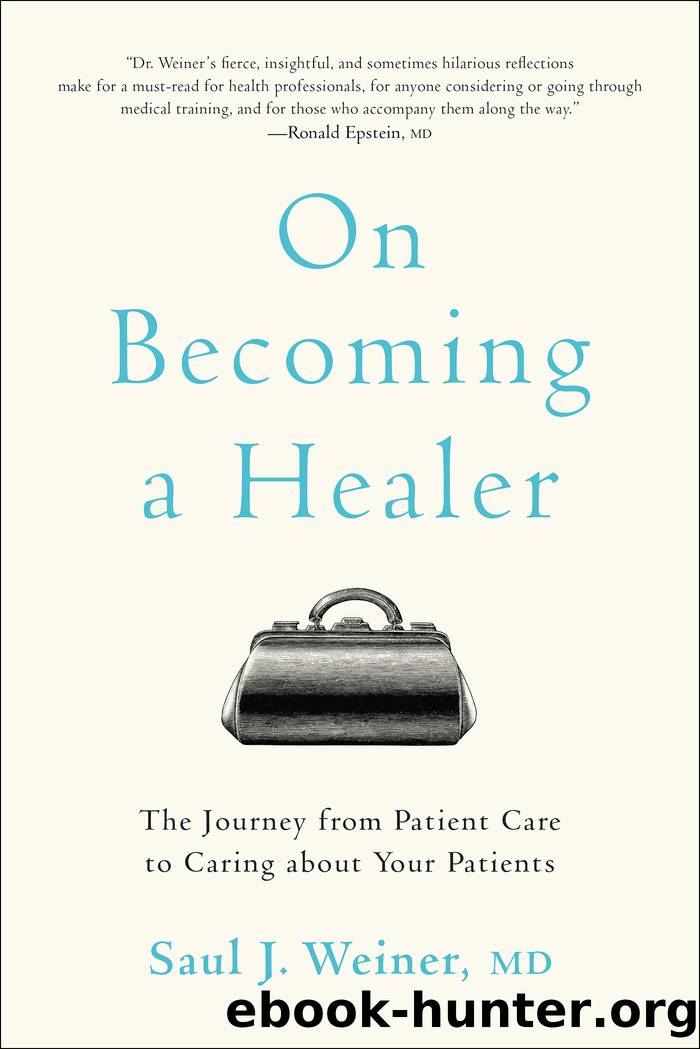On Becoming a Healer by Saul J. Weiner

Author:Saul J. Weiner
Language: eng
Format: epub
Publisher: Johns Hopkins University Press
Published: 2020-07-14T16:00:00+00:00
Growing as a Healer
Your clinical skills are almost certain to grow during the course of your training and in the early years of your career. After taking care of hundreds and then thousands of patients, you will develop strong pattern recognition and reliable intuition about what actions to take, particularly when caring for patients who are very ill. But how do you grow as the person who is the physician acquiring these skills, so that those you care for benefit not only from your technical abilities but from who you are? Your well-being matters too: most people who choose medicine as a career indicate, often in their medical school applications, that they seek meaningful interactions with patients. And yet so many hold patients at arm’s length, unaware of what they’re doing. All they know is that their work is more depleting then fulfilling. How do you avoid this rut?
First, by not blaming your lack of connection with patients on “not enough time,” the extensive use of technology in health care, or the electronic medical record. While I agree those are all problems, they are not the cause. Openly engaging with people is not conditional on anything. You can’t chalk it up to being too busy.
Second—and this gets to the core—engaging with a diversity of people coming to you with a wide range of health needs requires attention to your own triggered emotions and how to interpret and respond to them. Self-awareness does not come easily, and the culture of medical training doesn’t make it easier. Throughout your training and into your medical career you learn to suppress whatever you are feeling, whether it is fatigue, frustration, anxiety, or self-doubt, by adopting a matter-of-fact, even-keeled external demeanor. There is the sense that your medical career is happening to you rather than that it is in fact yours. The default is that over time you become an unobjectionable, technically competent task completer at risk for burnout.
To avoid this common pathway, you must acquire and maintain a perspective on what you are going through that requires balancing two realities. On the one hand you have, in fact, joined an all-consuming social system similar to the military, with conventions and expectations from peers and superiors about how to comport yourself moment to moment, and even what to think. On the other hand, you must remember what being a physician is all about: caring for people who are sick, worried about their health, or becoming increasingly dependent on health care as they age. Some are jerks, some are nice, some are lost, and some are confused—just like the doctors who care for them. There are reasons for their attitudes and capabilities, which you’ll likely never know. They are wealthy, middle-income, and poor. They may look bored or indifferent, but they rarely are. They’ve come to see you, often at personal cost or inconvenience, because they trust that you are their best bet at getting the help they need.
When you are with a patient in a
Download
This site does not store any files on its server. We only index and link to content provided by other sites. Please contact the content providers to delete copyright contents if any and email us, we'll remove relevant links or contents immediately.
Periodization Training for Sports by Tudor Bompa(8275)
Why We Sleep: Unlocking the Power of Sleep and Dreams by Matthew Walker(6727)
Paper Towns by Green John(5193)
The Immortal Life of Henrietta Lacks by Rebecca Skloot(4589)
The Sports Rules Book by Human Kinetics(4391)
Dynamic Alignment Through Imagery by Eric Franklin(4217)
ACSM's Complete Guide to Fitness & Health by ACSM(4060)
Kaplan MCAT Organic Chemistry Review: Created for MCAT 2015 (Kaplan Test Prep) by Kaplan(4014)
Introduction to Kinesiology by Shirl J. Hoffman(3776)
Livewired by David Eagleman(3775)
The Death of the Heart by Elizabeth Bowen(3624)
The River of Consciousness by Oliver Sacks(3606)
Alchemy and Alchemists by C. J. S. Thompson(3522)
Bad Pharma by Ben Goldacre(3428)
Descartes' Error by Antonio Damasio(3279)
The Emperor of All Maladies: A Biography of Cancer by Siddhartha Mukherjee(3164)
The Gene: An Intimate History by Siddhartha Mukherjee(3099)
The Fate of Rome: Climate, Disease, and the End of an Empire (The Princeton History of the Ancient World) by Kyle Harper(3067)
Kaplan MCAT Behavioral Sciences Review: Created for MCAT 2015 (Kaplan Test Prep) by Kaplan(2987)
